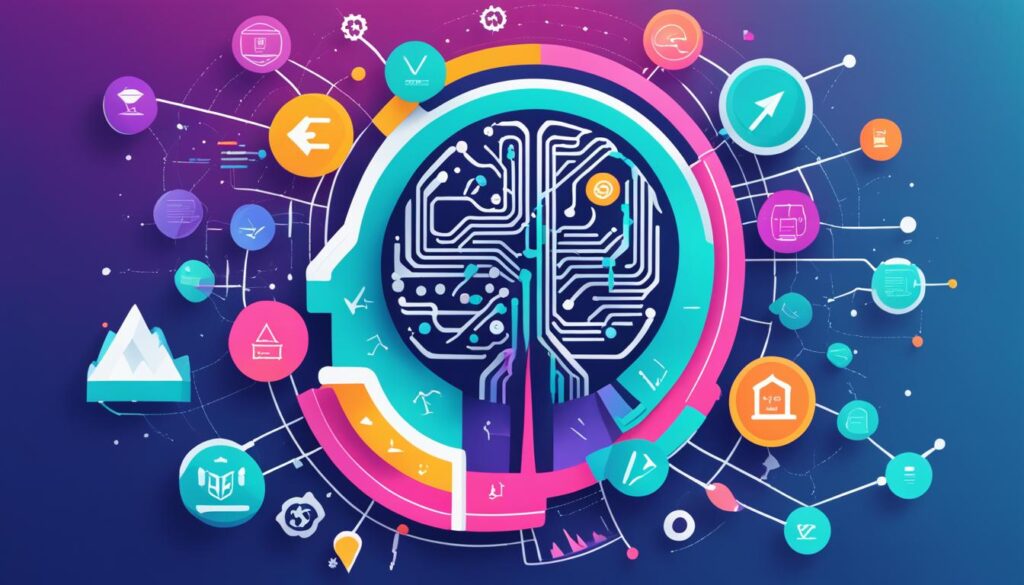AI-powered customer journey mapping is transforming how startups understand and engage with their customers. By leveraging advanced algorithms and machine learning, these tools provide deep insights into customer behavior, preferences, and pain points across various touchpoints. AI-driven journey mapping enables startups to create more personalized experiences, optimize marketing strategies, and ultimately drive customer satisfaction and loyalty.
Companies like Netflix and Spotify have set the bar high with their AI-powered customer experiences, but now startups across industries can access similar capabilities. AI tools for customer journey mapping offer features like sentiment analysis, automatic persona creation, and real-time journey monitoring. These innovations allow even small teams to gain a comprehensive understanding of their customers’ needs and expectations.
The integration of AI into customer journey mapping isn’t just a trend – it’s becoming a necessity for startups looking to compete in today’s data-driven marketplace. By analyzing vast amounts of customer data, AI can uncover patterns and insights that would be impossible to detect manually. This enables startups to make more informed decisions, allocate resources effectively, and create targeted strategies that resonate with their audience.
Key Takeaways
- AI-powered journey mapping provides startups with deeper customer insights and personalization opportunities
- Real-time data analysis allows for more agile and responsive customer experience strategies
- Ethical considerations are crucial as AI becomes more integral to customer journey mapping
The Rise of AI in Customer Experience

Artificial intelligence is transforming how businesses interact with customers. AI-powered tools enable more personalized, efficient, and data-driven experiences across the entire customer journey.
Understanding AI and Its Impact
AI uses machine learning algorithms to analyze vast amounts of customer data and derive actionable insights. This allows companies to predict customer needs and behaviors with unprecedented accuracy. Predictive analytics helps businesses anticipate issues and proactively address them before they impact the customer experience.
AI chatbots and virtual assistants are revolutionizing customer service by providing 24/7 support and quickly resolving common queries. This frees up human agents to handle more complex issues.
Personalization is reaching new heights with AI. Businesses can now tailor content, product recommendations, and marketing messages to individual preferences at scale.
AI Tools for Enhanced CX
AI-driven customer journey mapping tools provide real-time insights into customer behavior across touchpoints. This enables companies to identify pain points and optimize the customer experience continuously.
Sentiment analysis tools use natural language processing to gauge customer emotions from text and voice interactions. This helps businesses respond more empathetically and address issues promptly.
Automated A/B testing platforms leverage AI to rapidly test and optimize different customer experience elements. This data-driven approach leads to faster improvements and better outcomes.
Predictive lead scoring uses AI to identify the most promising prospects, allowing sales teams to focus their efforts more effectively.
Mapping the Customer Journey with AI

AI-powered customer journey mapping transforms how businesses understand and engage with customers. This innovative approach leverages real-time data and advanced analytics to create dynamic, personalized experiences across key touchpoints.
Key Stages in the AI-Infused Customer Cycle
The AI-enhanced customer journey typically encompasses three main stages: awareness, consideration, and retention. In the awareness stage, AI analyzes online behavior and demographics to identify potential customers and tailor initial interactions.
During the consideration stage, AI personalizes content and offers based on individual preferences and browsing history. This targeted approach increases the likelihood of conversion.
The retention stage utilizes predictive analytics to anticipate customer needs and prevent churn. AI-driven recommendations and timely support interventions help maintain long-term customer relationships.
Throughout these stages, AI continuously refines touchpoints, ensuring a seamless and responsive customer experience.
Real-Time Data and Customer Insights
AI-powered journey mapping relies on real-time data collection and analysis to provide up-to-the-minute customer insights. This allows businesses to respond swiftly to changing customer needs and market trends.
Advanced AI algorithms process vast amounts of data from multiple sources, including:
- Website interactions
- Social media activity
- Purchase history
- Customer support interactions
These insights enable businesses to create highly personalized experiences and anticipate customer needs. AI also helps maintain data quality by identifying and correcting inconsistencies, ensuring accurate and reliable customer profiles.
By leveraging AI in customer journey mapping, businesses can create more engaging, efficient, and profitable customer relationships.
Tailoring Experiences Through Personalization

AI-driven personalization is revolutionizing how startups engage with customers. By leveraging data and predictive analytics, companies can create uniquely tailored experiences that boost satisfaction and loyalty.
Transformative Personalization Techniques
AI-powered personalization enables startups to analyze customer behavior and preferences in real-time. This allows for dynamic content delivery and product recommendations that evolve with each interaction.
Customer segmentation has become increasingly sophisticated. AI algorithms can identify micro-segments based on subtle behavioral patterns, allowing for hyper-targeted marketing campaigns.
Predictive analytics plays a crucial role in anticipating customer needs. By analyzing historical data, AI can forecast future behaviors and preferences, enabling proactive engagement strategies.
Personalized content goes beyond simple name insertion. AI systems can tailor entire web experiences, emails, and product offerings based on individual user profiles and browsing history.
Success Stories of Personalized Marketing
Netflix stands out as a leader in personalization. Their recommendation engine analyzes viewing habits to suggest content, resulting in improved user engagement and reduced churn rates.
Holiday retail success stories often highlight the power of personalization. Many e-commerce startups have seen significant increases in conversion rates by implementing AI-driven product recommendations during peak shopping seasons.
B2B startups have also benefited from personalization. By tailoring content and outreach based on company size, industry, and decision-maker roles, they’ve achieved higher lead quality and faster sales cycles.
Personalized email campaigns driven by AI have shown remarkable results. Startups report open rates increasing by up to 30% when subject lines and content are customized to individual recipients’ interests and behaviors.
Maximizing Customer Satisfaction and Loyalty

AI technologies are transforming how businesses enhance customer satisfaction and build long-term loyalty. These innovations enable proactive service and personalized loyalty programs that create lasting connections with customers.
Leveraging AI for Proactive Customer Service
AI-powered chatbots and virtual assistants now provide instant, 24/7 support to customers. These tools can quickly resolve common issues and answer frequently asked questions, reducing wait times and frustration.
Sentiment analysis algorithms monitor customer interactions across channels to detect potential problems early. This allows companies to address concerns before they escalate, improving overall satisfaction.
AI also enables personalized product recommendations and tailored communications. By analyzing past behavior and preferences, businesses can anticipate customer needs and provide relevant offers at the right time.
Investing in Customer Loyalty Programs
AI-driven loyalty programs use data analytics to create highly targeted rewards and incentives. These programs go beyond simple point systems, offering personalized perks that resonate with individual customers.
Predictive modeling helps identify customers at risk of churning. Companies can then proactively engage these individuals with special offers or outreach to maintain their loyalty.
AI algorithms optimize loyalty program structures, determining the most effective reward tiers and point values. This ensures programs remain financially sustainable while maximizing customer engagement and retention.
Ethical Considerations and Future Trends

AI-powered customer journey mapping introduces new ethical challenges and opportunities for startups. Privacy concerns and the rapid evolution of AI technologies shape how companies approach personalization and data usage.
Navigating the Privacy Landscape
Startups must carefully balance personalization with privacy protection. Data quality is crucial for effective AI implementation, but collecting extensive customer information raises ethical questions. Companies need robust data governance policies to ensure compliance with regulations like GDPR and CCPA.
Transparency is key. Startups should clearly communicate how customer data is used and allow opt-out options. Implementing data minimization practices helps reduce privacy risks.
Anonymization techniques can protect individual identities while still providing valuable insights. Regular privacy audits and impact assessments are essential to maintain customer trust and stay ahead of evolving regulations.
AI’s Evolution and Its Implications
The rapid advancement of AI technologies like generative AI and large language models is transforming customer journey mapping. These tools offer unprecedented capabilities for predictive analytics and personalization.
Startups can leverage AI to anticipate customer needs and provide proactive support. However, the increasing sophistication of AI raises concerns about algorithmic bias and decision-making transparency.
Ethical AI development practices are crucial. This includes diverse training data, regular bias audits, and human oversight of AI-generated insights.
As AI capabilities grow, startups must consider the long-term implications. Preparing for potential job displacement and upskilling employees will be important. Establishing ethical guidelines for AI use in customer interactions is essential to maintain trust and brand integrity.
Frequently Asked Questions

AI-powered customer journey mapping offers startups powerful tools to understand and engage customers. This technology provides data-driven insights, personalization capabilities, and automated tracking of key metrics to optimize the customer experience.
How can AI improve customer journey mapping in startups?
AI enhances customer journey mapping by analyzing vast amounts of data to identify patterns and trends. It can uncover insights invisible to the human eye, allowing startups to make data-driven decisions.
AI algorithms can predict customer behavior and preferences, enabling startups to anticipate needs and create more targeted strategies.
What are the benefits of an AI-powered customer journey map for small businesses?
AI-powered journey maps provide small businesses with deeper customer insights without requiring large teams or budgets. They enable highly personalized customer interactions tailored to individual preferences and behaviors.
These maps help identify pain points and opportunities for improvement in the customer experience, leading to increased satisfaction and loyalty.
In what ways does AI contribute to customer engagement and retention?
AI chatbots and virtual assistants offer immediate responses to customer inquiries, improving response times and availability. They can handle a wide range of tasks, from answering questions to facilitating transactions.
AI-driven personalization creates more relevant and engaging experiences throughout the customer journey, increasing the likelihood of retention.
How does AI personalize experiences at different stages of the customer journey?
AI analyzes customer data to create tailored content and product recommendations at each stage. During the awareness stage, it can display targeted ads based on browsing history and preferences.
In the consideration phase, AI can offer personalized product comparisons or customized pricing. Post-purchase, it can provide relevant support and upsell opportunities based on usage patterns.
What metrics can AI track to optimize the startup customer journey?
AI can track and analyze conversion rates at each stage of the journey, identifying where customers drop off. It measures customer lifetime value, helping startups focus on high-value segments.
Engagement metrics like time spent on site, click-through rates, and content interactions are easily monitored by AI systems. Customer satisfaction scores and sentiment analysis provide insights into overall experience quality.
How does AI analyze customer behavior for better journey mapping?
AI uses machine learning algorithms to process large volumes of customer data, including purchase history, browsing behavior, and demographic information. It identifies correlations and patterns to segment customers and predict future actions.
Natural language processing allows AI to analyze customer feedback and social media interactions, providing qualitative insights into customer sentiment and preferences.


